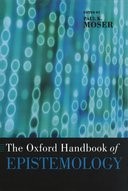 The Oxford Handbook of Epistemology
The Oxford Handbook of Epistemology
Contents
-
-
-
-
-
-
I. Basic Sources of Knowledge and Justification I. Basic Sources of Knowledge and Justification
-
II. Testimony as an Essential Source II. Testimony as an Essential Source
-
III. Sources and Grounds III. Sources and Grounds
-
IV. The Epistemic Autonomy of the Basic Sources IV. The Epistemic Autonomy of the Basic Sources
-
V. Coherence V. Coherence
-
VI. Conclusion VI. Conclusion
-
Notes Notes
-
-
-
-
-
-
-
-
-
-
-
-
-
-
-
-
-
-
-
-
2 The Sources of Knowledge
Get accessRobert Audi is Professor of Philosophy and David E. Gallo Chair in Ethics at the University of Notre Dame. He works in ethics and in related philosophical fields, especially epistemology. His books include Action, Intention, and Reason (1993), The Structure of Justification (1993), Moral Knowledge and Ethical Character (1997), Religious Commitment and Secular Reason (2000), The Architecture of Reason (2001), The Good in the Right: A Theory of Intuition and Intrinsic Value (2004), and Moral Value and Human Diversity (2007).
-
Published:02 September 2009
Cite
Abstract
This article identifies the sources from which one acquires knowledge or justified belief. It distinguishes the “four standard basic sources”: perception, memory, consciousness, and reason. A basic source yields knowledge or justified belief without positive dependence on another source. This article distinguishes each of the above as a basic source of knowledge, with the exception of memory. Memory, while a basic source of justification, plays a preservative rather than a generative role in knowledge. This article contrasts basic sources with nonbasic sources, concentrating on testimony. After clarifying the relationship between a source and a ground, or “what it is in virtue of which one knows or justifiedly believes,” this article evaluates the basic sources' individual and collective autonomy as well as their vulnerability to defeasibility. It examines the relationship of coherence to knowledge and justification, noting the distinction between a negative dependence on incoherence and a positive dependence on coherence.
Sign in
Personal account
- Sign in with email/username & password
- Get email alerts
- Save searches
- Purchase content
- Activate your purchase/trial code
- Add your ORCID iD
Purchase
Our books are available by subscription or purchase to libraries and institutions.
Purchasing information| Month: | Total Views: |
|---|---|
| October 2022 | 54 |
| November 2022 | 43 |
| December 2022 | 22 |
| January 2023 | 161 |
| February 2023 | 107 |
| March 2023 | 114 |
| April 2023 | 59 |
| May 2023 | 45 |
| June 2023 | 30 |
| July 2023 | 13 |
| August 2023 | 18 |
| September 2023 | 22 |
| October 2023 | 46 |
| November 2023 | 23 |
| December 2023 | 33 |
| January 2024 | 28 |
| February 2024 | 37 |
| March 2024 | 34 |
| April 2024 | 30 |
| May 2024 | 49 |
| June 2024 | 25 |
| July 2024 | 23 |
| August 2024 | 33 |
| September 2024 | 82 |
| October 2024 | 31 |
| November 2024 | 43 |
| December 2024 | 38 |
| January 2025 | 27 |
| February 2025 | 14 |
| March 2025 | 28 |
| April 2025 | 9 |
Get help with access
Institutional access
Access to content on Oxford Academic is often provided through institutional subscriptions and purchases. If you are a member of an institution with an active account, you may be able to access content in one of the following ways:
IP based access
Typically, access is provided across an institutional network to a range of IP addresses. This authentication occurs automatically, and it is not possible to sign out of an IP authenticated account.
Sign in through your institution
Choose this option to get remote access when outside your institution. Shibboleth/Open Athens technology is used to provide single sign-on between your institution’s website and Oxford Academic.
If your institution is not listed or you cannot sign in to your institution’s website, please contact your librarian or administrator.
Sign in with a library card
Enter your library card number to sign in. If you cannot sign in, please contact your librarian.
Society Members
Society member access to a journal is achieved in one of the following ways:
Sign in through society site
Many societies offer single sign-on between the society website and Oxford Academic. If you see ‘Sign in through society site’ in the sign in pane within a journal:
If you do not have a society account or have forgotten your username or password, please contact your society.
Sign in using a personal account
Some societies use Oxford Academic personal accounts to provide access to their members. See below.
Personal account
A personal account can be used to get email alerts, save searches, purchase content, and activate subscriptions.
Some societies use Oxford Academic personal accounts to provide access to their members.
Viewing your signed in accounts
Click the account icon in the top right to:
Signed in but can't access content
Oxford Academic is home to a wide variety of products. The institutional subscription may not cover the content that you are trying to access. If you believe you should have access to that content, please contact your librarian.
Institutional account management
For librarians and administrators, your personal account also provides access to institutional account management. Here you will find options to view and activate subscriptions, manage institutional settings and access options, access usage statistics, and more.